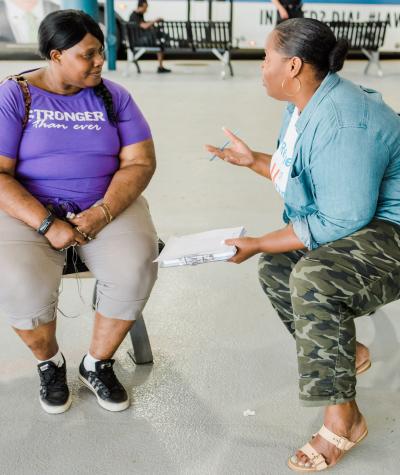In a major legal victory, a federal judge just struck a blow against Tennessee’s unequal and inaccessible felony disenfranchisement regime, ruling that Tennessee election officials cannot wrongly deny Tennesseans with past felony convictions their freedom to vote if they are eligible and the state must fully inform potential voters with past felony convictions of their eligibility.
Campaign Legal Center filed the lawsuit along with local partners, Free Hearts and the Tennessee NAACP, in 2020 because Tennessee's voter registration process creates unfair and unnecessary barriers to registration for people with felony convictions who never lost their freedom to vote or have already had their freedom to vote restored.
The right to vote is a basic American freedom. Yet felony disenfranchisement, a Jim Crow-era practice that takes away someone’s freedom to vote if they have been convicted of a felony, tramples on this fundamental right, silencing millions of Americans and robbing them of a say on the issues that matter to them.
The problem is particularly acute in Tennessee, which disenfranchises nearly 475,000 citizens, including more than 20% of Black Tennesseans. The state has a uniquely inaccessible, unequal and nearly impossible voting rights restoration process.
The court’s decision on April 18, 2024, struck a blow against Tennessee’s felony disenfranchisement regime — a big step in the right direction.
For years, Tennessee’s voter registration form plainly misled potential voters, incorrectly stating that a person with a felony conviction could not register if they had not received a pardon or restored their voting rights.
This is incorrect. Some Tennessee voters were convicted of a felony in a time period when the state did not have felony disenfranchisement; others have had their conviction overturned or expunged. Now, the language on the form will have to correctly reflect the law — a win for Tennessee voters.
Additionally, elections officials have had a policy of denying voter registration forms to anyone with a felony, even if that person indicated that they had never lost the right to vote.In 2019, the Tennessee NAACP and Campaign Legal Center informed the Tennessee Elections Division that these policies violated the National Voter Registration Act. In 2020, the groups, along with Free Hearts and Baker Donelson, brought a lawsuit.
This legal victory ensures that election officials provide all eligible Tennesseans with the opportunity to register to vote, which is a win for Tennesseans who have been wrongly denied a voice in their government for too long.
On a basic level, voting and other forms of civic participation are essential to feeling a sense of belonging and acceptance in society. Felony disenfranchisement serves no legitimate purpose within the criminal legal system and actually hinders rehabilitation and reentry. In fact, research shows that rights restoration promotes public safety.
At the end of the day, our vote is our voice, and it is the most powerful tool we have. Felony disenfranchisement robs Americans of a say in their governance — a direct affront to the ideals of American democracy.
Furthermore, felony disenfranchisement extends racial disparities in the criminal legal system to our democracy, which is why it’s so important that we work to end the practice.
Campaign Legal Center will continue to fight alongside our partners against Tennessee’s inequitable voting rights restoration process when the case proceeds to trial in December 2024.

